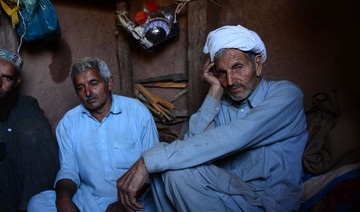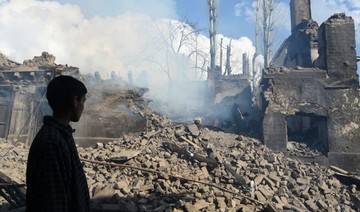NEW DELHI/ISLAMABAD: The sparring between India and Pakistan last month threatened to spiral out of control and only interventions by U.S. officials, including National Security Advisor John Bolton, headed off a bigger conflict, five sources familiar with the events said.
At one stage, India threatened to fire at least six missiles at Pakistan, and Islamabad said it would respond with its own missile strikes "three times over", according to Western diplomats and government sources in New Delhi, Islamabad and Washington.
The way in which tensions suddenly worsened and threatened to trigger a war between the nuclear-armed nations shows how the Kashmir region, which both claim and is at the core of their enmity, remains one of the world's most dangerous flashpoints.
The exchanges did not get beyond threats, and there was no suggestion that the missiles involved were anything more than conventional weapons, but they created consternation in official circles in Washington, Beijing and London.
Reuters has pieced together the events that led to the most serious military crisis in South Asia since 2008, as well as the concerted diplomatic efforts to get both sides to back down.
The simmering dispute erupted into conflict late last month when Indian and Pakistani warplanes engaged in a dogfight over Kashmir on Feb 27, a day after a raid by Indian jet fighters on what it said was a militant camp in Pakistan. Islamabad denied any militant camp exists in the area and said the Indian bombs exploded on an empty hillside.
In their first such clash since the last war between the two nations in 1971, Pakistan downed an Indian plane and captured its pilot after he ejected in Pakistan-controlled Kashmir.
Hours later, videos of the bloodied Indian pilot, handcuffed and blindfolded, appeared on social media, identifying himself to Pakistani interrogators, deepening anger in New Delhi.
With Prime Minister Narendra Modi facing a general election in April-May, the government was under pressure to respond.
"NO GOING BACK"
That evening, Indian National Security Adviser Ajit Doval spoke over a secure line to the head of Pakistan's Inter Services Intelligence (ISI), Asim Munir, to tell him India was not going to back off its new campaign of "counter terrorism" even after the pilot's capture, an Indian government source and a Western diplomat with knowledge of the conversations told Reuters in New Delhi.
Doval told Munir that India's fight was with the militant groups that freely operated from Pakistani soil and it was prepared to escalate, said the government source.
A Pakistani government minister and a Western diplomat in Islamabad separately confirmed a specific Indian threat to use six missiles on targets inside Pakistan. They did not specify who delivered the threat or who received it, but the minister said Indian and Pakistani intelligence agencies "were communicating with each other during the fight, and even now they are communicating with each other".
Pakistan said it would counter any Indian missile attacks with many more launches of its own, the minister told Reuters, speaking on condition of anonymity.
"We said if you will fire one missile, we will fire three. Whatever India will do, we will respond three times to that," the Pakistani minister said.
Doval's office did not respond to a request for comment. India was not aware of any missile threat issued to Pakistan, a government official said in reply to a Reuters request for comment.
Pakistan's military declined to comment and Munir could not be reached for comment. Pakistan's foreign ministry did not respond to a Reuters request for comment.
TRUMP-KIM TALKS
The crisis unfolded as U.S. President Donald Trump was trying to hammer out an agreement with North Korean leader Kim Jong Un in Hanoi over its nuclear programme.
U.S. security advisor Bolton was on the phone with Doval on the night of Feb 27 itself, and into the early hours of Feb 28, the second day of the Trump-Kim talks, in an attempt to defuse the situation, the Western diplomat in New Delhi and the Indian official said.
Later, U.S. Secretary of State Mike Pompeo, who was also in Hanoi, also called both sides to seek a way out of the crisis.
"Secretary Pompeo led diplomatic engagement directly, and that played an essential role in de-escalating the tensions between the two sides," State Department deputy spokesperson Robert Palladino said in a briefing in Washington on March 5.
A State Department official declined comment when asked if they knew of the threats to use missiles.
Pompeo spoke to Doval, the Indian and Pakistani Foreign Ministers Sushma Swaraj and Shah Mahmood Qureshi, respectively, Palladino said.
U.S. Indo-Pacific Command Admiral Phil Davidson told reporters in Singapore last week that he had separately been in touch with the Indian navy chief, Sunil Lanba, throughout the crisis. There was no immediate response from Lanba's office to a question on the nature of the conversations.
U.S. efforts were focused on securing the quick release of the Indian pilot by Pakistan and winning an assurance from India it would pull back from the threat to fire rockets, the Western diplomat in New Delhi and officials in Washington said.
"We made a lot of effort to get the international community involved in encouraging the two sides to de-escalate the situation because we fully realized how dangerous it was," said a senior Trump administration official.
The Pakistani minister said China and the United Arab Emirates also intervened. China's foreign ministry did not respond to requests for comment. The government of the UAE said Abu Dhabi Crown Prince Sheikh Mohammed bin Zayed al-Nahyan held talks with both Modi and Pakistan Prime Minister Imran Khan.
India has not given details, but has said it was in touch with major powers during the conflict.
On the morning of Feb 28, Trump told reporters in Hanoi that he expected the crisis to end soon.
"They have been going at it and we have been involved in trying to have them stop. Hopefully that is going to be coming to an end."
Later that afternoon, Khan announced in Pakistan's parliament that the Indian pilot would be released, and he was sent back the next day.
"I know last night there was a threat there could a missile attack on Pakistan, which got defused," Khan said. "I know, our army stood prepared for retaliation of that attack."
The two countries have gone to war three times since both gained independence in 1947, the last time in 1971. The two armies are trading fire along the line of control that separates them in Kashmir, but the tensions appear contained for now.
Diplomatic experts said that the latest crisis underlined the chances of misread signals and unpredictability in the ties between the nuclear-armed rivals, and the huge dangers. It still was not clear whether India had targeted a militant camp in Pakistan and whether there were any casualties, they said. "Indian and Pakistani leaders have long evinced confidence that they can understand each other’s deterrence signals and can de-escalate at will," said Joshua White, a former White House official who is now at Johns Hopkins.
"The fact that some of the most basic facts, intentions and attempted strategic signals of this crisis are still shrouded in mystery ... should be a sobering reminder that neither country is in a position to easily control a crisis once it begins.".
India, Pakistan threatened to unleash missiles at each other - sources
India, Pakistan threatened to unleash missiles at each other - sources
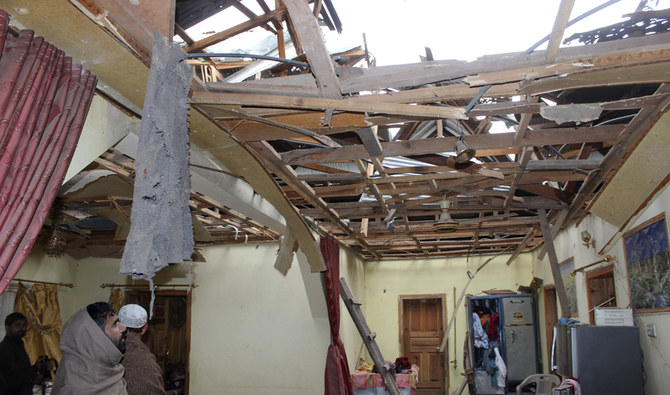
- Capture of Indian pilot after dogfight a trigger
- US leads intense efforts to defuse crisis
Pakistan urges Hajj pilgrims to get vaccinated five days before departure to Saudi Arabia
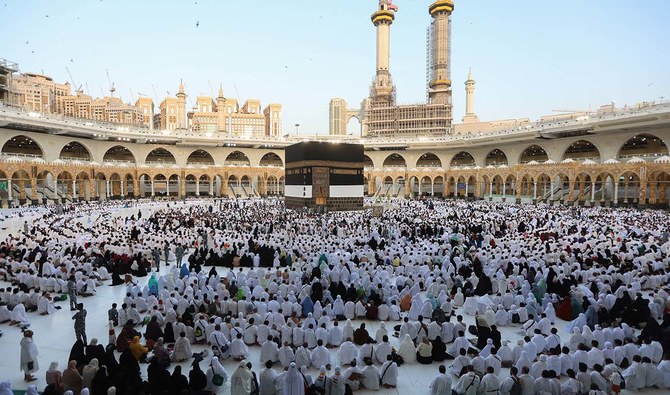
- Pakistani pilgrims require to vaccinate themselves against meningitis, seasonal influenza and polio
- The vaccinations are done at Hajji camps during the day in all major cities around the country
ISLAMABAD: Pakistan’s religious affairs ministry on Saturday asked Hajj pilgrims to get themselves vaccinated at least five days before departure to Saudi Arabia to avoid inconvenience.
Hajj pilgrims must comply with strict vaccination requirements set by the Saudi Ministry of Health to ensure public safety during one of the world’s largest annual gatherings.
Mandatory vaccines include the meningitis shot, with additional recommendations for the seasonal influenza vaccine, while travelers from regions prone to yellow fever and polio must also provide corresponding immunization certificates.
These precautions are vital to prevent the spread of infectious diseases among millions of pilgrims converging in the kingdom from across the globe.
“The intending pilgrims are advised to visit their respective Hajji camps five days (from 9 am to 5 pm) before their flight to receive vaccination against meningitis, seasonal influenza and polio, besides obtaining a yellow card,” the state-owned Associated Press of Pakistan (APP) news agency quoted a statement issued by the ministry.
“This is a mandatory requirement,” it added.
Hajj is one of the Five Pillars of Islam, which include the core beliefs and practices every Muslim is expected to follow.
The pilgrimage is required to be performed at least once in a lifetime by all adult Muslims who meet the necessary conditions of health and financial stability to travel to and perform the rituals in Makkah.
Pakistan plans to launch the special Hajj flight operation from May 9 that will continue until June 10.
Security forces kill six militants in northwest Pakistan
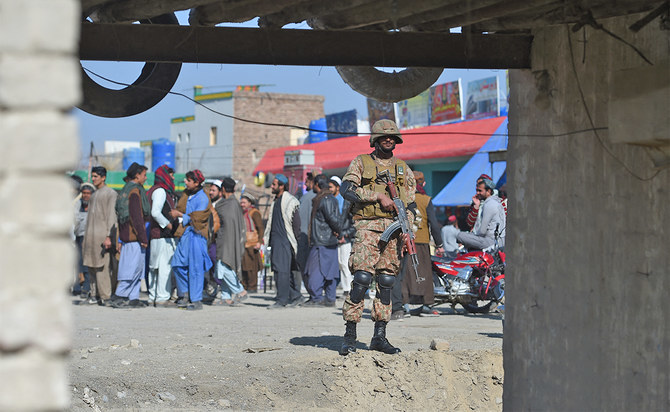
- The intelligence-based operation was carried out in North Waziristan that led to an intense exchange of fire
- The targeted militants were involved in violent attacks against security forces and civilians in the volatile area
ISLAMABAD: Pakistani security forces carried out an intelligence-based operation in North Waziristan tribal district in the early hours of Saturday, killing six militants after a heavy exchange of fire.
Located in the tribal belt along the Pakistan-Afghanistan border, North Waziristan has historically been known as a volatile region with significant militant activity.
The Pakistani military carried out several major operations in the area to dismantle militant networks and had success in reducing violence.
However, there have been reports of renewed militant activities in the region, prompting the Pakistani security forces to once again increase its focus on these challenges.
“On night 3/4 May 2024, security forces conducted an intelligence based operation in North Waziristan District, on reported presence of terrorists,” the military’s media wing, ISPR, said in a statement.
“During the conduct of operation, intense fire exchange took place between own troops and the terrorists,” it continued, adding that six militants were killed as a result.
The statement informed that the security forces also destroyed militant hideout during the operation and launched a “sanitization operation” in the area while trying to locate any remnants of the militant group.
“The killed terrorists remained actively involved in numerous terrorist activities against security forces as well as target killings of innocent civilians in the area,” the ISPR added.
Pakistan telecom authority seeks review of tax agency directive to block SIMs of non-filers
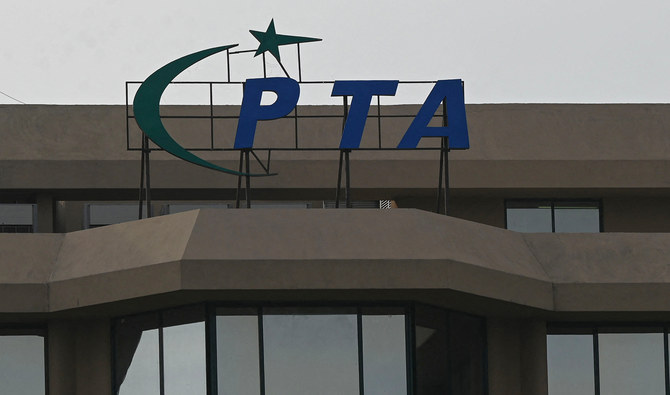
- Federal Board of Revenue issued a list of over half a million people who did not file tax returns in 2023
- Reports indicate that telecom companies showed reluctance to block the SIMs of so many subscribers
ISLAMABAD: The Pakistan Telecommunication Authority (PTA) on Saturday showed reluctance to implement the instructions of the country’s tax collection body to block the SIMs of non-filers, while asking the authority to review its decision.
The development came after the Federal Board of Revenue (FBR) issued a list of over half a million people who did not file income tax returns for 2023, instructing the PTA to block their cellphone SIMs as a penalty.
However, media reports indicated that telecom companies were reluctant to carry out the directives affecting so many subscribers, prompting an official meeting on Friday in which the government decided to act against anyone opposing FBR’s orders.
Still, the PTA circulated a brief notification on Saturday, seeking a review of the FBR’s decision.
“On the issue of blocking of mobile phone SIMs under section 114-B of Income Tax Ordinance, 2001, Pakistan Telecommunication Authority (PTA) has communicated to FBR that the Income Tax General Order (ITGO) in the manner as referred to the Authority needs review before its execution by the concerned entity/entities,” the notification said.
“In the meanwhile, PTA has also initiated consultation with stakeholders on the subject issue,” it added.
Pakistan has traditionally faced the challenge of convincing people to file their tax returns.
However, the government has decided now to implement stringent measures to address the problem, particularly in the context of negotiations for a new International Monetary Fund (IMF) program.
The IMF has frequently urged Pakistan to enhance its revenue collection from non-filers as part of broader economic reforms to support social and development initiatives.
In response, the FBR is taking steps like blocking the SIM cards of non-filers and considering other punitive measures to enforce tax compliance and widen the tax net.
Pakistan’s deputy PM, Saudi foreign minister discuss Muslim world issues at OIC summit
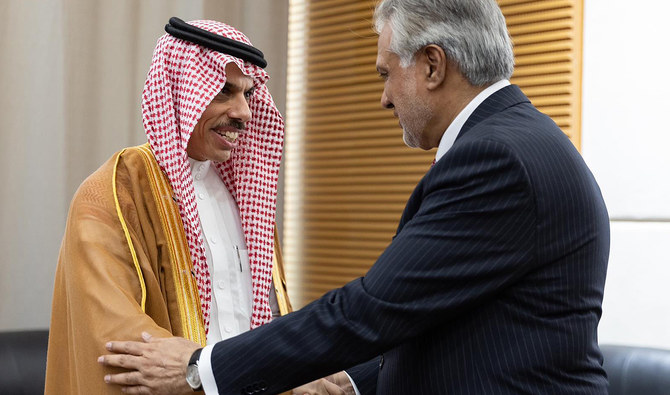
- Ishaq Dar stresses the significance of ceasefire in Gaza during his meetings with the Kuwaiti, Qatari and Egyptian FMs
- He also calls for more investment for his country and greater employment opportunities for Pakistanis in the Middle East
ISLAMABAD: Pakistan’s newly appointed Deputy Prime Minister Ishaq Dar met with Saudi Foreign Minister Prince Faisal bin Farhan and other Arab officials on the sidelines of the Organization of Islamic Cooperation (OIC) summit in Gambia on Saturday, emphasizing collective action to address the problems confronting the Muslim world.
The OIC summit is being held against a backdrop of widespread anger over Israel’s military actions in Gaza, which have resulted in the death of nearly 35,000 Palestinians along with a massive destruction of hospitals, schools and residential neighborhoods in the area.
There has been a clear uptick in Islamophobic sentiments and incidents in different parts of the world, particularly since the outset of the conflict last year in October.
The Pakistani deputy prime minister arrived in Gambia on Wednesday to present his country’s perspective on a wide range of issue, including the war in Gaza and the rights situation in the Indian-administered Kashmir.
“Deputy Prime Minister and Foreign Minister Mohammad Ishaq Dar @MIshaqDar50 today met Foreign Minister of Saudi Arabia H.R.H. Prince Faisal bin Farhan Al Saud @FaisalbinFarhan in Banjul, The Gambia,” the foreign office said in a social media post.
“They discussed strengthening strategic and economic relations between Pakistan and Saudi Arabia and enhancing economic cooperation and investment,” it continued. “They called for a ceasefire in Gaza and emphasized the importance of OIC’s role in addressing challenges concerning the Muslim Ummah including Islamophobia and the situations in Palestine and Kashmir.”
Dar also held separate meetings with the foreign ministers of Kuwait, Egypt and Qatar.
During his conversation with Abdullah Ali Al Yahya of Kuwait, he discussed the possibility of further strengthening bilateral cooperation.
He noted the government wanted to transform the “traditionally fraternal ties with Kuwait into a mutually beneficial economic partnership.”
Dar also discussed further consolidation in trade and investment with Qatar’s Sheikh Mohammed bin Abdulrahman Al Thani while seeking more employment opportunities for young Pakistanis.
He emphasized on an immediate ceasefire in Gaza during his interactions for all Arab officials, commending Egypt’s role in supporting international humanitarian assistance for Palestine in his meeting the Egyptian Foreign Minister Sameh Hassan Shoukry.
Pakistan Cricket Board reviews venue upgrades in meeting ahead of ICC Champions Trophy 2025
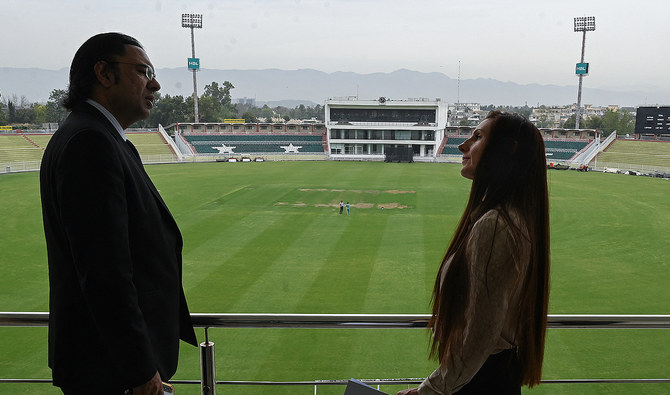
- PCB chairman says upgradation work has been delayed, asks authorities to hire international consultant
- It will be the first major international cricket tournament hosted solely by Pakistan since the 1996 World Cup
ISLAMABAD: The Pakistan Cricket Board (PCB) held a meeting at its headquarters in Lahore to review the upgradation plan for major cricket venues in the country on Saturday ahead of the two-week ICC Champions Trophy next year.
The meeting was presided over by the PCB chairman, Mohsin Naqvi, who directed the relevant officials to immediately hire international consultant to upgrade the Qaddafi Stadium Lahore, National Bank Stadium Karachi and Rawalpindi Stadium.
“The stadium upgradation work has already been delayed,” he observed during the meeting according an official PCB statement, instructing the authorities to speed up the process.
He also instructed to form a three-member committee to ensure the hiring process was carried out in keeping with the rules and regulations.
The PCB plans to provide world-class facilities at the three Pakistani cricket stadiums.
Its upgradation plan includes structural changes to the boxes along with improved facilities and numbered seats for spectators.
Additionally, the number of seats in the enclosures on both sides of the main gate of the Qaddafi Stadium will also be increased.
The PCB chairman directed the replacement of screens for scoreboards and live streaming, instructing the officials to prepare the feasibility to install new floodlights in the stadiums.
The ICC Champions Trophy is scheduled to take place in Pakistan from February to March 2025.
It is expected to be a significant event since it will mark the first major international cricket tournament hosted solely by Pakistan since the 1996 Cricket World Cup.
The tournament will include top-ranked One Day International (ODI) teams, with Pakistan having automatically qualified as the host nation.


